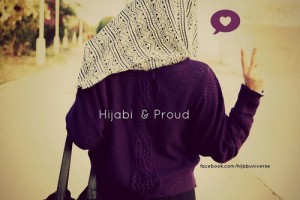We Are Part of the Problem?
Inferiority complex within Muslim society is manifested in various facets. The most noticeable is the way Muslims desperately imitate an alien culture and lifestyle while despising, and being highly critical of Islamic teachings. The negative connotation attached to hijab is one example.
In Muslim-predominated countries, things can get very complicated and confusing because those who look down upon hijab and Islamic values are adherents of the very same faith. This group of people generally comes from the highly educated stratum, seems to live in constant denial and attempts to hide their inadequacy by impersonating western characters whom they deem superior and first-class. In this context, the abandonment of hijab has little to do with the idea of women subjugation rather it is purely an expression of subservience to the western taste and desperation of the weaker to emulate the stronger.
Another group of Muslims on the other hand communicate their sense of insecurity by way of being excessively sensitive or defensive when facing questions or challenges as regards to Islam. They perceive every inquiry, change or new idea as threat and thus vocally despise anyone who dares question a practice associated with Islam or contest a so-called Islamic idea, even when it is still unclear whether the subject matter is genuinely Islamic or merely cultural.
Fear of the unknown and unfounded phobia of anything western drives them to defend what they believe as sacred, usually scaring away the rest of the world. Hijab in this context is often interpreted in its most extreme and severe form with minimal compromise. Anything lesser is deemed evil and sin.
The third faction is overly apologetic while discussing Islamic teachings or when trying to explain this religion in the face of misconceptions. In doubt and hesitation, they attempt to find an impossible balance between appreciating what is clearly Islamic and meeting challengers’ expectations. The lack of confidence in Islamic teachings and external pressure make this group feel as if they owe the world an explanation and apology for doing something against the norm.
In reality, there is nothing to be sorry for. Showing remorse only reveals a deep-rooted inadequacy, thereby reinforcing the doubts and suspicion of adversaries.
At the end of the day, what humans yearn for are acknowledgement, approval and prominence. The Quran has revealed a verse, which deserves much contemplation: “Whoever desires honor, power and glory, to Allah (alone) belong all the honor, power and glory.” (Fatir: 10)
The human natural thirst for such qualities is beautifully acknowledged but Allah softly reminds us that only by following His path and faithfully identifying ourselves with Him alone, we will deserve the status and reputation that we so crave for. The opposite is nonetheless true; searching for honor and recognition from any other source than God and His teachings will only bring disappointment, disgrace and humiliation.
My experience with hijab- a detachment followed by a most humble moment of re-embracing it- has repeatedly reminded me that this unique feature of Muslim women is a huge honor. Being not merely about a piece of cloth on your head, hijab symbolizes the beautiful concept of grace and decency, which represents a state of humans being highly civilized and cultured.
It does not only elevate the status of women by spiritually embellishing their natural God-given physical elegance, but simultaneously sends a revolutionary message to mankind; by adopting modesty, women are to be treated with full respect far from either subjugation or bodily exploitation. They are on equal terms with men and so ought to be judged by their mind, personality, virtue and competency.
By practicing hijab, I now hold the pride of identifying myself with Islam and rejecting any sense of inferiority or the need for imitation to prove my self-worth or win anyone’s pleasure. Hijab and my faith in God have liberated my mind from the desperation of the ‘brown sahib’ mentality and all other sorts of psychological manipulation, and my heart from the perpetual anxiety that once imprisoned me.
First published: March 2014
Pages: 1 2
